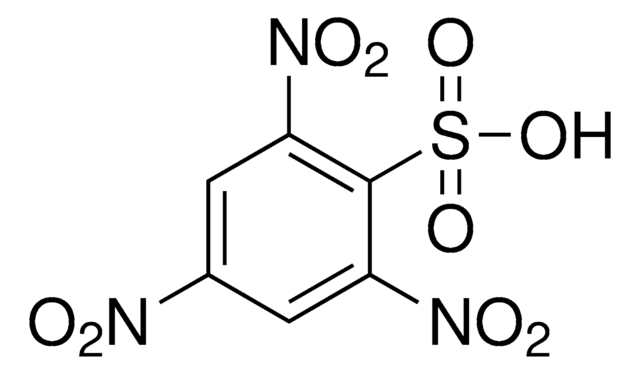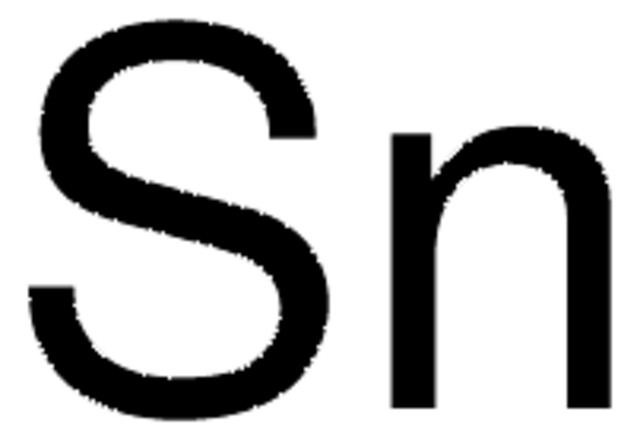Alle Fotos(1)
Wichtige Dokumente
95372
Bismut
granular, ≥99.99% trace metals basis
Synonym(e):
Bi
Anmeldenzur Ansicht organisationsspezifischer und vertraglich vereinbarter Preise
Alle Fotos(1)
About This Item
Empirische Formel (Hill-System):
Bi
CAS-Nummer:
Molekulargewicht:
208.98
EG-Nummer:
MDL-Nummer:
UNSPSC-Code:
12161600
PubChem Substanz-ID:
NACRES:
NA.22
Empfohlene Produkte
Dampfdruck
<0.1 mmHg ( 20 °C)
Qualitätsniveau
Assay
≥99.99% trace metals basis
Form
granular
Eignung der Reaktion
core: bismuth
reagent type: catalyst
Widerstandsfähigkeit
129 μΩ-cm, 20°C
bp
1560 °C (lit.)
mp (Schmelzpunkt)
271 °C (lit.)
272 °C
Dichte
9.8 g/mL at 25 °C (lit.)
SMILES String
[Bi]
InChI
1S/Bi
InChIKey
JCXGWMGPZLAOME-UHFFFAOYSA-N
Suchen Sie nach ähnlichen Produkten? Aufrufen Leitfaden zum Produktvergleich
Verwandte Kategorien
Allgemeine Beschreibung
Bismuth is a silvery, very brittle metal with a high metallic luster. In the periodic table, it is next to lead. Bismuth has a variety of applications, including medicine, materials synthesis, organic synthesis, and catalysis . It is used in the production of malleable iron and as a catalyst in the manufacture of acrylic fibers . Additionally, bismuth promotes noble metal-based catalysts for the selective oxidation of alcohols, aldehydes and carbohydrates with molecular oxygen in liquid phases.
Anwendung
Bismuth granules are used in the preparation of bismuth nanoparticles by solution dispersion method. It is a precursor to synthesize bismuth-silicate glasses.
Bismuth is used as a precursor in the synthesis of Cu3BiS3 based solar device.
Lagerklassenschlüssel
11 - Combustible Solids
WGK
nwg
Flammpunkt (°F)
Not applicable
Flammpunkt (°C)
Not applicable
Persönliche Schutzausrüstung
Eyeshields, Gloves, type N95 (US)
Hier finden Sie alle aktuellen Versionen:
Besitzen Sie dieses Produkt bereits?
In der Dokumentenbibliothek finden Sie die Dokumentation zu den Produkten, die Sie kürzlich erworben haben.
Kunden haben sich ebenfalls angesehen
Modification of carbon screen-printed electrodes by adsorption of chemically synthesized Bi nanoparticles for the voltammetric stripping detection of Zn (II), Cd (II) and Pb (II).
Rico MAG, et al.
Talanta, 80(2), 631-635 (2009)
A simple way to prepare bismuth nanoparticles.
Zhao Y, et al.
Materials Letters, 58(5), 790-793 (2004)
The role of bismuth in the SOHIO process
Hanna TA
Coordination Chemistry Reviews, 248(5-6), 429-440 (2004)
Characterization of structural, thermal and mechanical properties of bismuth silicate glasses.
Bochentyn B, et al.
Journal of Non-Crystalline Solids, 439(2), 51-56 (2016)
B Arnaud et al.
Physical review letters, 110(1), 016405-016405 (2013-02-07)
By means of first principles calculations, we compute the effective electron-phonon coupling constant G(0) governing the electron cooling in photoexcited bismuth. G(0) strongly increases as a function of electron temperature, which can be traced back to the semimetallic nature of
Unser Team von Wissenschaftlern verfügt über Erfahrung in allen Forschungsbereichen einschließlich Life Science, Materialwissenschaften, chemischer Synthese, Chromatographie, Analytik und vielen mehr..
Setzen Sie sich mit dem technischen Dienst in Verbindung.





